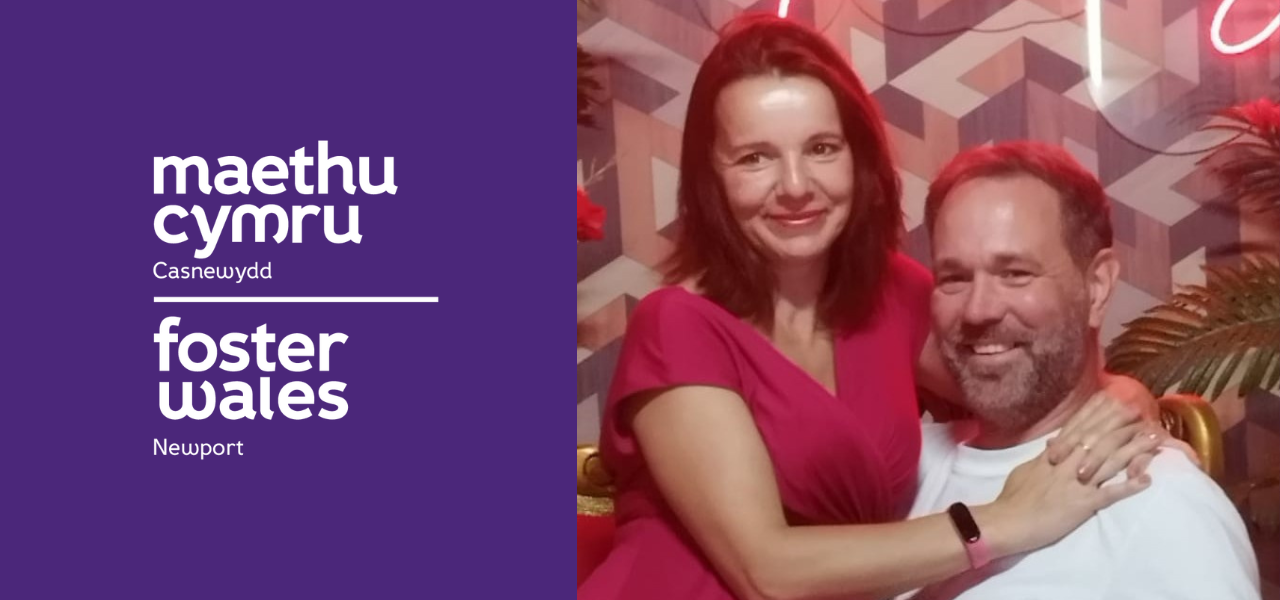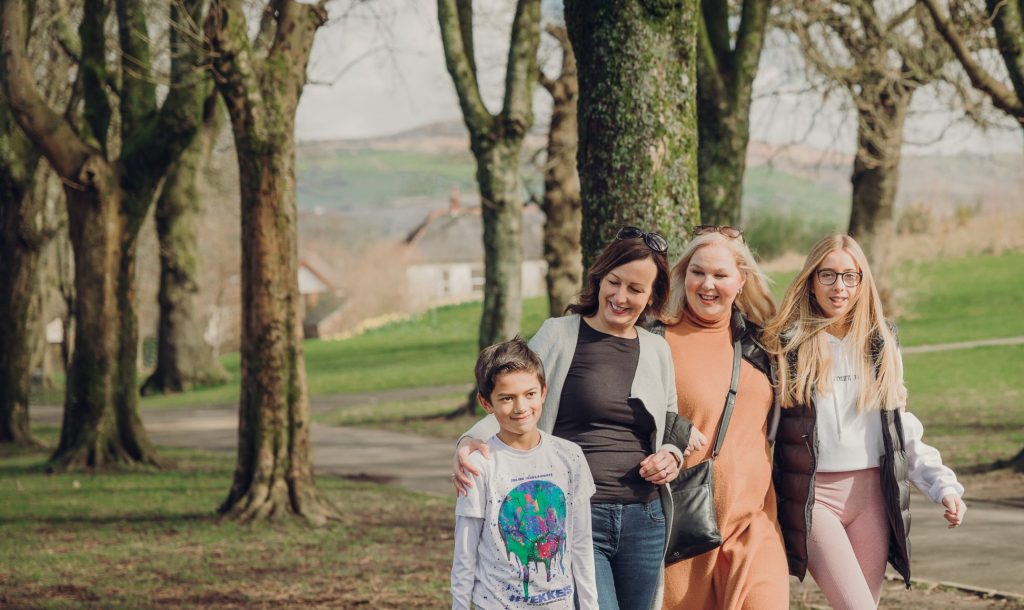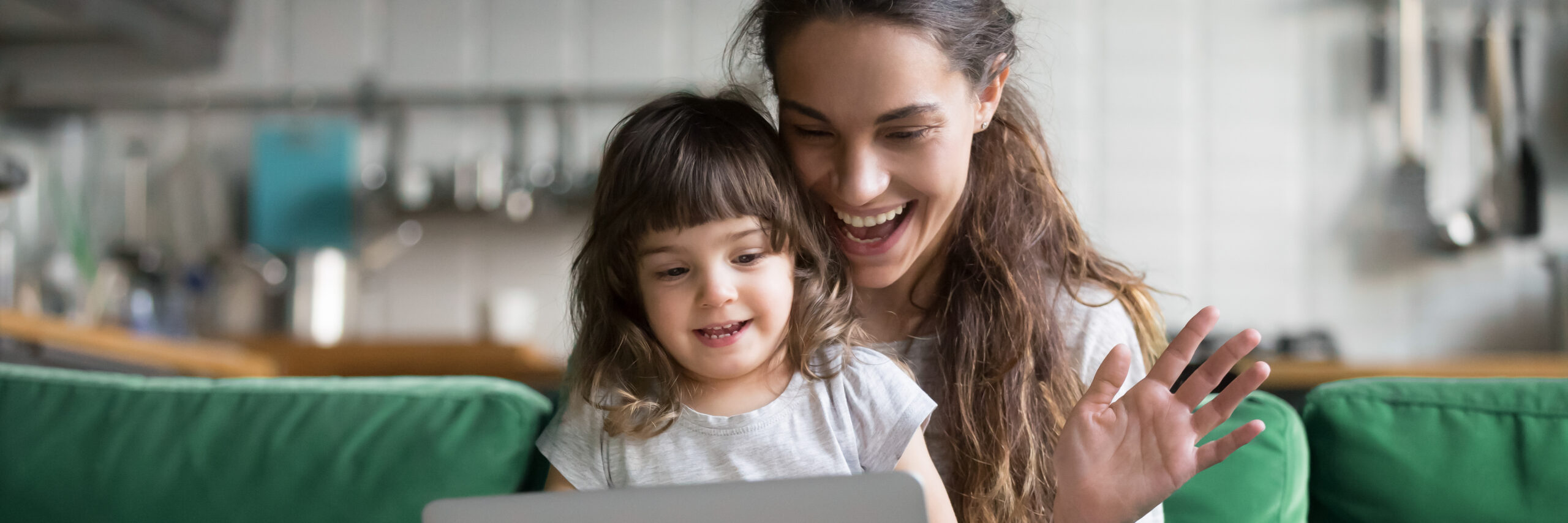
Lucy and Lee had been fostering young children in Newport for over 6 years before they decided to care for a young refugee seeking asylum. They have 4 children of their own and both work.
We had a chance to speak to them about their incredible fostering journey.
It can inspire you to offer love and support to children and young vulnerable people in your local area and bring a real difference to their lives.
How do you find fostering with Foster Wales Newport?
Fostering for Newport Council has been great, and we find working with the social care team an easy experience.
Why did you decide to foster with your Local Authority and not an agency?
The council are first responders and we wanted to help local children. We also felt that receiving an income for our fostering services should not be at the financial detriment of the council so working for a ‘for profit’ organisation was not for us.
What was the biggest challenge when you started your fostering journey?
Adjustment within our own family and balancing the right levels of attention between our birth children and foster children. Learning the system you are part of doesn’t come with a manual so as you gather experience of working with the various agencies you will become much more confident.
How long have you been fostering and what made you foster?
We have fostered with Newport Council for about 8 years. We got into fostering as we felt we could have a positive impact on children’s lives. Not everyone gets a decent start to life, and we felt we had space in our lives to bring about a positive change for a young person. Both Lucy and I come from different childhood backgrounds and having raised 4 birth children felt we had the ability to help further. Offering a young person a pathway to fulfilling their potential and being a good person in society means a lot to us.
What was the process like for you?
Liz was our fostering assessor. She would visit our family for group discussions but also to research our immediate family relationships. She completed individual interviews to learn all about our own families and childhood upbringings. After several months of working with Liz this accumulated in her final assessment report and recommendation. This assessment and your medical checks are then presented to a panel in Newport Council who you meet in person at the first assessment. They asked a few probing questions to explore our motivations and we were then approved.
Do you have any preferences when it comes to fostering?
We left Newport Council to decide this and be guided by the professionals about what they thought would match us and our family home.
So, what was your first placement like?
We had two boys, siblings. One was 5 at the time, and the other was 3.
One was a very quiet young man with a thirst for learning, very reserved, his younger brother was very active and always looking to play.
Our task was to look after the children, make sure all day-to-day needs were met and that they attended school. We would also meet with parents at the family centre a couple of times a week. We kept a diary of the children’s progress for both the social workers and their parents. We focused on working with the children to make sure they settled well with us. We spent a lot of time in play centres and doing various craft activities including both our birth children. They were treated no different and received the same level of encouragement and reward. We learnt a lot regarding what social workers have to achieve and the tight line they walk. We found our social worker great at communication, advice and support.
It must be a good feeling seeing the children like this after everything they’ve been through.
Absolutely! Teaching young children to be good people and to give a good start in life we hope makes for a better society and they will pass on these life skills to the next generation.
What were your feelings before the first child was placed with you?
Our first placement came not long after our approval. We were partly excited but also aware of what the young person might be feeling. You just have to use your best judgement. The social workers are always there, on WhatsApp, or a phone call away.
So, how do you approach fostering? Is there anything you do or pattern you follow?
What we always do when we have a new person arrive is provide structure and routine whilst helping the young person find their place in the family. They are invited to take part in activities that help them connect with us. I generally find my own children are the natural healers and bond makers before us.
How do you feel when a child has to leave?
Most foster carers will go through grieving emotions when a child moves on, each relationship is special and it’s hard to say goodbye. What you have to keep in mind is your role and by working with the professionals you’re helping the young person prepare for this next chapter.
Did you learn fostering in any way, from courses or training, or just your experience?
As a professional foster carer, you need to complete a certain amount of training throughout the year, this is delivered virtually and with face-to-face meetings. There are courses to help develop your skills on subjects around child development you might be interested in. Aim to do about 15-20hrs. Once you have your young person then you will quickly learn the expectations of the social worker and what agreed goals you might have. You will keep a diary and share regular updates, and these might be discussed to get a shared understanding.
What’s the biggest reward for you for being foster carers?
There are many rewards in fostering and yours will be unique to you. It might be achieving milestones, the first hug or your own sense of pride telling you the impact you’re having. For us we have seen children go from shy and quiet to noisy, happy fun-loving children. It’s always a great talking point when this happens.

So, having fostered mostly small children, why did you decide to help a young person seeking asylum?
At that time, we hadn’t fostered for a few months, as we normally take a little break between placements. We agreed to help this young man short-term until social services found him a place the following week. The young person was vulnerable and didn’t speak English. Over the weekend we supported him and started to research what was involved in foster care for an Unaccompanied Asylum-Seeking Child (UASC). We spoke with his social worker to gain a better understanding and from that moment we accepted him indefinitely.
So how did the first few days/weeks go?
We didn’t have much experience with fostering teenagers (except from our own birth children) and this was complicated by the language barrier. During the first few weeks we met with various people online (due to Covid-19 lockdown) and a translator. We took the young person shopping as he arrived with nothing! We worked with the Barnardo’s charity who have experts on hand, and they allocate specific time to talk with us and with our placement. We are mostly attempting to establish how he arrived in Newport and what his journey might have involved.
Within the first few weeks, we met other foster carers with children from the same country which is great. We registered him for ESOL English lessons at Nash college and provided a bus pass.
What was initially the biggest challenge of supporting the young asylum seeker?
Language barrier first followed by dietary requirements and how this links to religious followings.
Getting to know someone when neither of you speak the same language is not as daunting as you might think. You have access to a translator, but this isn’t practical all the time, so we found fun both ways in using pen and paper and a translation app.
As the relationship develops you naturally learn about their history, and this should be logged and shared with the social worker. Ultimately, you’re learning about their journey to the UK, and this can help support their application to remain. This is not a quick process and can sometimes be challenging. As with fostering of local children, children share more as they get comfortable with you. In our experience cooking food is popular and we really enjoyed preparing traditional meals from their home countries.
With regards to the asylum process there are some key stages you need to make sure happen, but your social worker will lead the way. Ultimately your hard work in learning your child’s journey to the UK and why they are not able to return home is documented and sent to the government for assessment. Once the documentation is reviewed your child is then interviewed by UK immigration to determine if they receive their 5 years right to remain. Your child or a young person will be anxious in the preparation and run up to this interview and will need a lot of support and they will be aware not all are granted. It’s really a tough time for them and for you but we found focusing on developing their skills for adulthood a good distraction.
What did you feel was your main goal in supporting your young person?
We knew we had 12-18 months to prepare him to possibly be deported back home, so we wanted to make sure that he had as many self-sufficient skills as possible. We supported him in learning how to cook safely, laundry washing, ironing, shopping, self-care, all those grown-up things we have learnt ourselves.
We also taught him how to book a doctor’s appointment, how to open a bank account, how public transport works and anything about how to live in Wales.
We need to make sure that these young people get the best possible chance to achieve their potential here or elsewhere. Instilling this foundation to have a good successful life is important to us.
Would you help a young refugee again? What do you feel this experience gave you?
Yes! Definitely. We actually just found out we’re going to cover for somebody else over Christmas. We’re now going to learn all about Iranian culture! It’ll be interesting and fun. We’ve already had some tips about diet and shopping for Halal food.
Young refugees give you a different experience in fostering. When you foster local children it’s generally due to family issues and quite complex. Fostering a refugee gives you a clear path and clear end goal. When you’ve got a young person from another country, you need to open your eyes to much more global issues and be accepting of new religions and cultural behaviours. Your young person will come from a very different country with potentially no education system and not be able to read or write. We found it quite rewarding learning, and seeing a child learn our culture. It’s very much a two-way sort of street, as opposed to just that nurturing, emotional contact that you have with younger and local children. We will definitely keep fostering with Newport Council.
So, as we’re approaching Christmas, tell me how you handle special occasions and holidays when you support a young person from a different culture?
We make every effort to learn about their special cultural days they celebrate. In Asia you would have a red envelope where you put money in, you’d have a cake, and fruit as a display of fruitfulness for the next year.
For Christmas we treat him exactly the same as any other child in our house; he would have presents, we play lots of games, join family visits and trips out.
He would be learning our language and interacting, and we think he really enjoyed it. Our birth children have this ability to relate to other children and bring them out of their shells and show more of their personality. Barnardo’s were really good too; they sent him a little package and we also introduced him to an online Catholic church (due to Covid19).
How would you challenge the popular beliefs about unaccompanied asylum-seeking young people?
With education, knowledge and recommending not reading the tabloids, as they always highlight the negative side of asylum journeys. What fears people may have is more myth and rumour than it is truth and fact.
Amongst the many people who enter this country there are very vulnerable people who are lost, having no parents or lost parents on their journey here, no ability to communicate and nowhere to live.
They have false expectations about coming to the UK and most of the children will not understand the system or have an ability too.
What would your advice be to someone who’s thinking about fostering a young refugee?
Be open minded, join other foster carers who care for young refugees. Engage with Barnardo’s and get learning about the culture your young person comes from.
Be a source of guidance and support. You don’t have to do everything for them. We introduced our young person to the bus system and local gym. In our view we as foster carers are guardians for him and want to help him to become independent. I think it also helps a lot to be curious and inquisitive if you think about helping young refugees. We love travelling, we like to explore new cultures and enjoy finding out about those very different cultures to ours, so it’s been a good fit for us.
Having a child from another country is a fascinating, and exciting new opportunity for you. It can be daunting, but there are great resources out there, don’t be scared. The best advice is to buddy up with other carers, every question you have, someone else has asked, so there’s answers out there. Best of luck! There are lots of us locally, ready to give any help, reassurance, and give advice you need.
Are you ready to open your home and heart to vulnerable young refugees and guide them into a better and brighter future? We want to hear from you.
If you live in Newport, Wales, send us a message, and we will get back to you as soon as we can. Alternatively, you can call us on 01633 210272 for a friendly non-obligatory chat.
If you live elsewhere in Wales, visit the Foster Wales website, where you can find all the necessary information about fostering and contact details for your local authority fostering service.
Choosing Foster Wales is a decision to work with real people in your local community, who put children’s and young people’s best interest at the core of everything they do.

